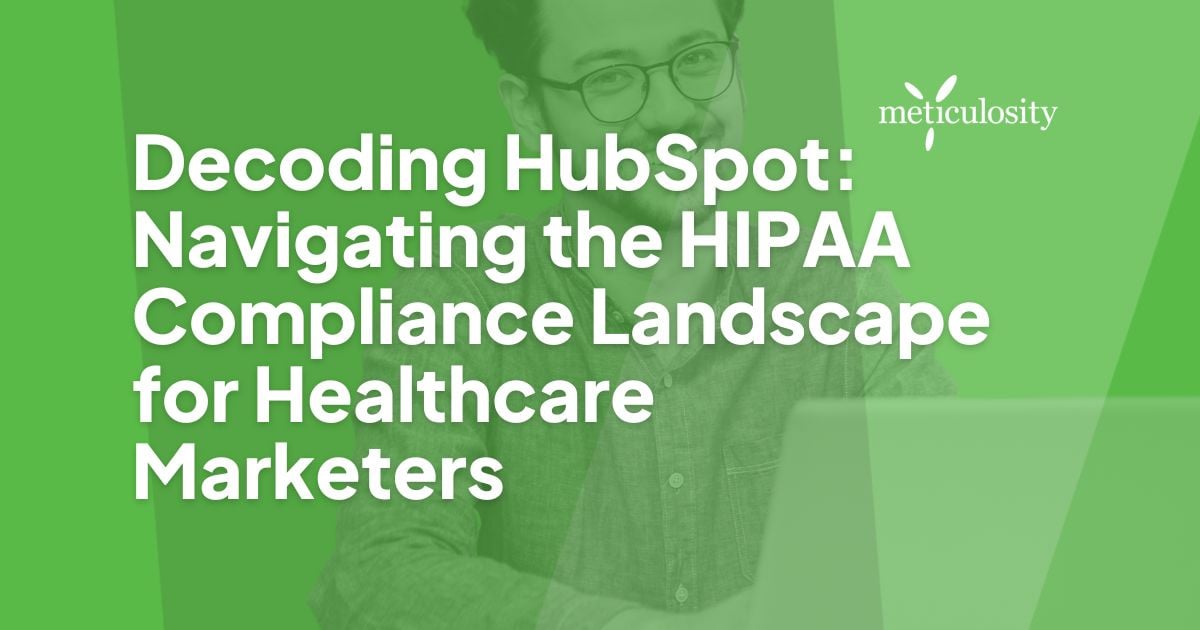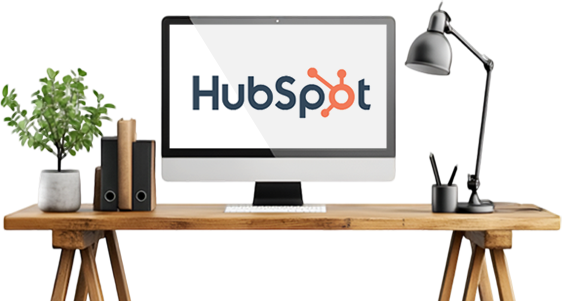Navigating through the intricate landscape of HIPAA compliance while trying to take full advantage of HubSpot can feel like uncharted territory.
Surprisingly, a study revealed that 70% of CRM systems weren't up to scratch when meeting the necessary standards for HIPAA compliance. This blog is specially tailored toward understanding and managing HIPAA compliance within HubSpot.
Key Takeaways
- HIPAA compliance is important for CRM systems like HubSpot to ensure the safety and privacy of patient data.
- HubSpot takes the security of patient data seriously and implements strong measures such as encryption and access control to protect it.
- Healthcare marketers using HubSpot should obtain a Business Associate Agreement (BAA) and follow proper procedures for handling patient data to maintain HIPAA compliance.
- Training employees on HIPAA rules, regularly auditing HubSpot usage, and utilizing its built-in security features are key steps in ensuring HIPAA compliance with HubSpot.
Understanding HIPAA Compliance for CRM systems
HIPAA rules make sure all patient data is safe. CRM systems like HubSpot have to follow these rules, too. This means they can't let anyone see or change the data without saying so. It's important because if someone gets into the system, they could use this info in bad ways.
These systems must always check who is going in and out, too. So, only people with special rights can see or change the info. The HIPAA rules also say that any changes made should be tracked down to who did it.
In short, a good CRM system has to keep data private and safe as per HIPAA laws.
What is HIPAA Compliance and Why Is It Important for CRMs?
HIPAA is a set of rules in the United States. It helps to keep private health information safe. HIPAA stands for Health Insurance Portability and Accountability Act. A tool that handles patient data must follow these rules.
This tool can be something like a CRM or Customer Relationship Management system.
CRMs take care of important tasks for businesses. These tasks include tracking sales, storing customer details, and sending emails. But CRMs also handle sensitive stuff like patient data if they serve healthcare firms.
This is where HIPAA comes in! HIPAA ensures any tool dealing with this kind of data keeps it safe from harm or loss. If someone who shouldn't see the data gets hold of it, there could be big problems! So, it's vital for any CRM to be HIPAA compliant!
HubSpot's Approach to HIPAA Compliance
HubSpot goes above and beyond to ensure the safety of patient data, meeting stringent security standards for HIPAA compliance. Discover how they keep your information secure.
Keeping Patient Data Safe
HubSpot takes the safety of patient data very seriously. The platform uses strong tools to keep your information secure. It uses things like firewalls and encryption to guard against intruders.
This peace of mind lets you focus on helping your patients, not worrying about security breaches.
Meeting Security Standards
To ensure the security of patient data, HubSpot has implemented robust measures to meet security standards. This includes encryption of sensitive information and strict access control policies.
By following these guidelines, healthcare marketers can have peace of mind knowing that HubSpot is taking the necessary steps to protect their data from unauthorized access or breaches.
It's important for businesses to understand and adhere to these security standards to maintain HIPAA compliance and safeguard patient privacy.
Looking to optimize HubSpot for your business? Learn how to improve here.
The Challenges of Using HubSpot for HIPAA Compliance
Using HubSpot for HIPAA compliance can present challenges, such as obtaining a Business Associate Agreement and ensuring proper handling of patient data. To learn more about how to navigate these challenges and ensure HIPAA compliance with HubSpot, continue reading.
Obtaining a Business Associate Agreement
To ensure HIPAA compliance when using HubSpot, it's important to obtain a Business Associate Agreement (BAA). This agreement establishes the responsibilities and obligations between your healthcare organization and HubSpot as a business associate.
It outlines how patient data will be handled, protected, and secured.
The BAA should cover important aspects such as data privacy, security measures, breach notification procedures, and restrictions on using or disclosing patient information. To obtain a BAA from HubSpot, you can contact their support team or account manager, who will guide you through the process.
By obtaining a BAA with HubSpot, you can have peace of mind knowing that your patient data is being handled in accordance with HIPAA regulations. It creates a legal framework that ensures both parties are committed to protecting sensitive healthcare information.
Proper Handling of Patient Data
To ensure HIPAA compliance when using HubSpot, it is crucial to handle patient data properly. This means following strict guidelines and procedures to protect the security and privacy of sensitive information.
First, train your employees on HIPAA rules and educate them about safeguarding patient data. Regularly audit the usage of HubSpot to identify any potential vulnerabilities or breaches in security.
Use HubSpot's built-in security measures like encryption and access control features. By taking these steps, you can properly handle patient data and uphold HIPAA compliance standards.

Tips for Ensuring HIPAA Compliance with HubSpot
Train employees on HIPAA rules, regularly audit HubSpot usage, and utilize HubSpot's built-in security measures to ensure your healthcare organization remains compliant. Read the full blog post to discover more valuable tips for navigating the HIPAA compliance landscape with HubSpot.
Train Employees on HIPAA Rules
To ensure HIPAA compliance with HubSpot, it's important to train your employees on HIPAA rules. This will help them understand their responsibilities when handling patient data and ensure they follow the necessary protocols to protect sensitive information.
By providing comprehensive training on HIPAA regulations, you can empower your employees to make informed decisions and take appropriate actions to maintain compliance. Regular training sessions can also serve as a refresher and keep your team up-to-date with HIPAA rules or guidelines changes.
So remember, educating your employees is crucial for maintaining HIPAA compliance with HubSpot.
Regularly Audit HubSpot Usage
To stay compliant with HIPAA regulations, it's important for healthcare marketers to audit their usage of HubSpot regularly. This means reviewing and evaluating how the platform is being used to handle patient data and ensuring that all processes align with HIPAA guidelines.
By conducting regular audits, you can identify potential vulnerabilities or areas for improvement in your workflows and make necessary adjustments to protect patient privacy and maintain data security.
These audits should cover access control, encryption measures, employee training on HIPAA rules, and adherence to internal policies and procedures. By monitoring your HubSpot usage, you can ensure that your marketing efforts remain effective and compliant.
Utilize HubSpot's Built-In Security Measures
To ensure HIPAA compliance, healthcare marketers can take advantage of HubSpot's built-in security measures. These features are designed to keep patient data safe and meet the necessary security standards.
You can protect sensitive information from unauthorized access by using HubSpot's encryption and access control settings. It is also important to regularly review and audit your HubSpot usage to identify any potential vulnerabilities.
By taking advantage of these security measures, you can have peace of mind knowing that your CRM system is helping you maintain HIPAA compliance.
How HubSpot Can Benefit Healthcare Organizations
HubSpot offers numerous benefits for healthcare organizations, including streamlined marketing and communication processes and efficient data management capabilities.
Streamlined Marketing and Communication
HubSpot offers healthcare organizations streamlined marketing and communication solutions. With its CRM system, you can easily manage patient data and create personalized marketing campaigns.
HubSpot's automation features help save time and effort by automating repetitive tasks such as email outreach and follow-ups. This allows healthcare marketers to focus on delivering relevant content to their target audience while ensuring compliance with HIPAA regulations.
Efficient communication tools like email templates and live chat further enhance the customer experience, making it easier for patients to engage with your organization. Overall, HubSpot provides a user-friendly platform that simplifies marketing processes in the healthcare industry.
Efficient Data Management
Efficient data management is crucial for healthcare organizations using HubSpot. With the ability to automate marketing and communication, HubSpot streamlines processes and stores valuable patient data.
To ensure HIPAA compliance, it's important to manage this data efficiently. This includes regular auditing of HubSpot usage, training employees on HIPAA rules, and utilizing HubSpot's built-in security measures.
By implementing these practices, healthcare marketers can confidently navigate the HIPAA compliance landscape while benefiting from efficient data management provided by HubSpot.

Conclusion
In conclusion, HubSpot is HIPAA compliant, which means it meets the necessary security standards to protect patient data. However, healthcare marketers still need to exercise caution when using HubSpot for HIPAA compliance.
This includes obtaining a Business Associate Agreement and properly handling patient data. By following these tips and utilizing HubSpot's built-in security measures, healthcare organizations can benefit from streamlined marketing and efficient data management while ensuring HIPAA compliance.
Click here to learn more about HubSpot marketing.
FAQs
1. Is HubSpot considered HIPAA compliant, and can it be used for healthcare-related data?
HubSpot doesn't explicitly advertise itself as being HIPAA (Health Insurance Portability and Accountability Act) compliant. HubSpot is primarily designed for marketing, sales, and customer service functionalities. While it provides security features, it may not meet all the requirements for handling sensitive healthcare data covered by HIPAA.
2. Can I use HubSpot for healthcare marketing without violating HIPAA regulations?
Using HubSpot for general marketing activities in the healthcare industry is possible, but caution must be exercised. HubSpot is not inherently designed to manage protected health information (PHI) covered by HIPAA. It's crucial to separate marketing activities from handling patient data. Any transfer or storage of sensitive health information should be done through platforms explicitly designed and certified for HIPAA compliance.
3. Does HubSpot offer any HIPAA-compliant features or plans?
HubSpot does not have specific features or plans that are explicitly designated as HIPAA compliant. Organizations dealing with PHI should explore dedicated HIPAA-compliant solutions for tasks related to patient data management, such as electronic health records (EHR) systems and secure communication platforms.
4. What steps should healthcare organizations take when using HubSpot for marketing to maintain compliance?
-
Separation of Data: Ensure a clear separation between marketing activities and the handling of patient health information. HubSpot should be used for marketing purposes, while healthcare data management should be performed through HIPAA-compliant platforms.
-
Encryption and Security Measures: Implement additional encryption and security measures to safeguard any data transmitted or stored within HubSpot. This can include using secure communication channels and adopting best practices for data protection.
-
Review Terms of Service: Regularly review HubSpot's Terms of Service and consult with legal and compliance professionals to understand any updates or changes that may impact handling healthcare-related data.
-
Stay Informed: Keep abreast of any new features or updates from HubSpot that may impact compliance. Additionally, consider contacting HubSpot's support or compliance teams for the latest information.







